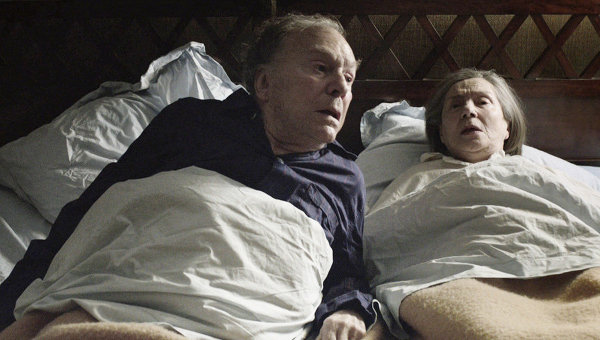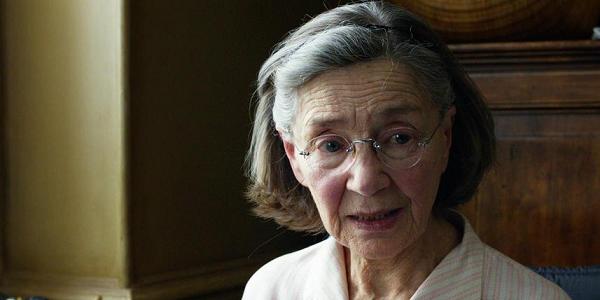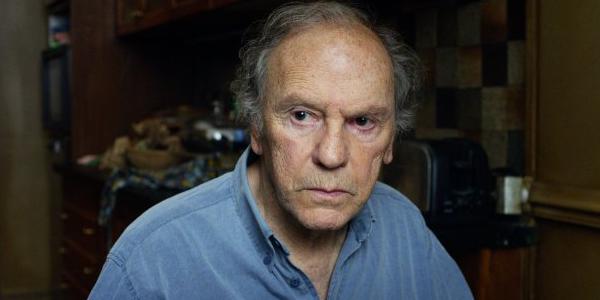Amour Review: Michael Haneke Turns Heartbreak Into Beauty
Donovan's Rating: 10/10
Fused Rating: 8.5/10
(2 reviews total)
Michael Haneke’s
Amour so beautifully conveys the perseverance of true love, even in the midst of chaos and disaster. Georges (Jean-Louis Trintignant) and Anne (Emmanuelle Riva) are put to the test as
Amour examines their relationship through life-altering trials and tribulations.
Noise clutters the first few moments of the film as people break down a door. We already know this isn’t going to be a cheerful experience, but we don’t exactly know what we’re in for.
Amour then moves to a grand music performance attended by retired music teachers Georges and Anne. The loving octogenarian couple then returns to their home, moving the film to its primary setting. Despite the sound of its first few scenes, most of
Amour moves forward in near silence, never letting you forget the difficulties of the central couple, the darkness of their conflict.

We see Georges and Anne leading a relatively quaint and simple life with each other. But even in their daily routines, their love is evident. It’s truly a thing of wonder to watch Riva and Trintignant delicately bounce off each other in these lighter moments. I imagine an entire film of this light dynamic would make for a nice-enough film, but the bittersweet
Amour sees their feelings, their routines, their lives change forever.
Anne sits motionless at the kitchen table, crossing to this comatose state in an instant, her face a total blank. In this quiet moment of cinematic brilliance, Riva takes precedence over all else. Being the heart of the film, she delivers an exquisite performance of immense physicality and emotional depth. She bares her soul in this amazing performance, making her struggle the focal point of the film. Georges’ dilemma drives the narrative forward, and Trintignant takes to the challenge of his understated and (mostly) static role beautifully, but it’s the powerhouse work from Riva that gives him cause to push forward, her desires conflicting with those of Trintignant.

Perhaps what’s so profound about
Amour is how it tackles it story with such simplicity. The film navigates the waters of drama without the flourishes one might expect. There are no laughable reaction shots or embarrassing music cues. The film incorporates music only when necessary, and especially well in a scene with some marvelous visual trickery from Darius Khondji, whose long takes and shots of the minute setting brilliantly frame and convey the struggles of Georges and Anne as well as heighten the tension of every moment. There’s beauty in the pain, and from simplicity we see this story as it unfolds without any unnecessary flourishes.
Georges makes a shocking decision – seemingly in an instant as fleeting as Riva’s transition – that changes everything. It’s a moment Haneke handles as delicately as everything else in the film despite its gravity.
Amour concludes almost as simply as it begins, but it’s a resolution so immense and so sudden that it devastates.

We live in a world where “good filmmaking” consists of constant “action” on screen, obvious character motivations, and happy endings. But Haneke’s study of tragedy’s toll on romance depends on subtle yet soaring performances from Riva and Trintignant (as their daughter, Isabelle Huppert fits well into her brief turn), internalized conflicts, and a bittersweet resolution. For those reasons – its subtlety, its nuances, its defiance of a finale that makes us cheer – the film greatly succeeds.
With its considerable Oscar buzz,
Amour might serve as many viewers' introduction to Haneke's work, and that doesn't seem to matter as far as appreciating the experience; the director’s careful handling of the subject matter and of the incomparable Riva and Trintignant – not to mention a great albeit brief turn from Isabelle Huppert as the central couple’s daughter – expertly captures the essence of this painful yet beautiful story.
Most of us haven’t gone through the ordeals of Georges and Anne, but no one is immune to tragedy.
Amour tells such a real story, something so intrinsic to the human experience. It’s a tale of loss, but it’s also a tale of love as its title suggests.
Amour is a film whose immense impact will stay with you for years to come.
 Simon Thought:
Simon Thought: "
Unequivocally a showcase for understated but powerful performances, Amour is not particularly potent when it comes to crafting a tragedy of its own but rather that it is thoroughly capable of evoking a response from its viewers, as most of us have gone through a similarly soul-crushing ordeal. Connecting with a film on an intimate level is one thing, but having a movie make an impression almost exclusively due to one’s own experiences is another. Despite the minimalist and intimate nature of Haneke’s material, we’re kept at a distance, never gleaning much depth into these characters or the driving force between their motivations or emotions. Combined with gratuitous shots of nothing and an ending that caught me entirely off guard, Amour is collection of universal ideas and themes brought to life by veteran thesps, but little more." Rating: 7/10
 We see Georges and Anne leading a relatively quaint and simple life with each other. But even in their daily routines, their love is evident. It’s truly a thing of wonder to watch Riva and Trintignant delicately bounce off each other in these lighter moments. I imagine an entire film of this light dynamic would make for a nice-enough film, but the bittersweet Amour sees their feelings, their routines, their lives change forever.
Anne sits motionless at the kitchen table, crossing to this comatose state in an instant, her face a total blank. In this quiet moment of cinematic brilliance, Riva takes precedence over all else. Being the heart of the film, she delivers an exquisite performance of immense physicality and emotional depth. She bares her soul in this amazing performance, making her struggle the focal point of the film. Georges’ dilemma drives the narrative forward, and Trintignant takes to the challenge of his understated and (mostly) static role beautifully, but it’s the powerhouse work from Riva that gives him cause to push forward, her desires conflicting with those of Trintignant.
We see Georges and Anne leading a relatively quaint and simple life with each other. But even in their daily routines, their love is evident. It’s truly a thing of wonder to watch Riva and Trintignant delicately bounce off each other in these lighter moments. I imagine an entire film of this light dynamic would make for a nice-enough film, but the bittersweet Amour sees their feelings, their routines, their lives change forever.
Anne sits motionless at the kitchen table, crossing to this comatose state in an instant, her face a total blank. In this quiet moment of cinematic brilliance, Riva takes precedence over all else. Being the heart of the film, she delivers an exquisite performance of immense physicality and emotional depth. She bares her soul in this amazing performance, making her struggle the focal point of the film. Georges’ dilemma drives the narrative forward, and Trintignant takes to the challenge of his understated and (mostly) static role beautifully, but it’s the powerhouse work from Riva that gives him cause to push forward, her desires conflicting with those of Trintignant.
 Perhaps what’s so profound about Amour is how it tackles it story with such simplicity. The film navigates the waters of drama without the flourishes one might expect. There are no laughable reaction shots or embarrassing music cues. The film incorporates music only when necessary, and especially well in a scene with some marvelous visual trickery from Darius Khondji, whose long takes and shots of the minute setting brilliantly frame and convey the struggles of Georges and Anne as well as heighten the tension of every moment. There’s beauty in the pain, and from simplicity we see this story as it unfolds without any unnecessary flourishes.
Georges makes a shocking decision – seemingly in an instant as fleeting as Riva’s transition – that changes everything. It’s a moment Haneke handles as delicately as everything else in the film despite its gravity. Amour concludes almost as simply as it begins, but it’s a resolution so immense and so sudden that it devastates.
Perhaps what’s so profound about Amour is how it tackles it story with such simplicity. The film navigates the waters of drama without the flourishes one might expect. There are no laughable reaction shots or embarrassing music cues. The film incorporates music only when necessary, and especially well in a scene with some marvelous visual trickery from Darius Khondji, whose long takes and shots of the minute setting brilliantly frame and convey the struggles of Georges and Anne as well as heighten the tension of every moment. There’s beauty in the pain, and from simplicity we see this story as it unfolds without any unnecessary flourishes.
Georges makes a shocking decision – seemingly in an instant as fleeting as Riva’s transition – that changes everything. It’s a moment Haneke handles as delicately as everything else in the film despite its gravity. Amour concludes almost as simply as it begins, but it’s a resolution so immense and so sudden that it devastates.
 We live in a world where “good filmmaking” consists of constant “action” on screen, obvious character motivations, and happy endings. But Haneke’s study of tragedy’s toll on romance depends on subtle yet soaring performances from Riva and Trintignant (as their daughter, Isabelle Huppert fits well into her brief turn), internalized conflicts, and a bittersweet resolution. For those reasons – its subtlety, its nuances, its defiance of a finale that makes us cheer – the film greatly succeeds.
With its considerable Oscar buzz, Amour might serve as many viewers' introduction to Haneke's work, and that doesn't seem to matter as far as appreciating the experience; the director’s careful handling of the subject matter and of the incomparable Riva and Trintignant – not to mention a great albeit brief turn from Isabelle Huppert as the central couple’s daughter – expertly captures the essence of this painful yet beautiful story.
Most of us haven’t gone through the ordeals of Georges and Anne, but no one is immune to tragedy. Amour tells such a real story, something so intrinsic to the human experience. It’s a tale of loss, but it’s also a tale of love as its title suggests. Amour is a film whose immense impact will stay with you for years to come.
We live in a world where “good filmmaking” consists of constant “action” on screen, obvious character motivations, and happy endings. But Haneke’s study of tragedy’s toll on romance depends on subtle yet soaring performances from Riva and Trintignant (as their daughter, Isabelle Huppert fits well into her brief turn), internalized conflicts, and a bittersweet resolution. For those reasons – its subtlety, its nuances, its defiance of a finale that makes us cheer – the film greatly succeeds.
With its considerable Oscar buzz, Amour might serve as many viewers' introduction to Haneke's work, and that doesn't seem to matter as far as appreciating the experience; the director’s careful handling of the subject matter and of the incomparable Riva and Trintignant – not to mention a great albeit brief turn from Isabelle Huppert as the central couple’s daughter – expertly captures the essence of this painful yet beautiful story.
Most of us haven’t gone through the ordeals of Georges and Anne, but no one is immune to tragedy. Amour tells such a real story, something so intrinsic to the human experience. It’s a tale of loss, but it’s also a tale of love as its title suggests. Amour is a film whose immense impact will stay with you for years to come.
 Simon Thought: "Unequivocally a showcase for understated but powerful performances, Amour is not particularly potent when it comes to crafting a tragedy of its own but rather that it is thoroughly capable of evoking a response from its viewers, as most of us have gone through a similarly soul-crushing ordeal. Connecting with a film on an intimate level is one thing, but having a movie make an impression almost exclusively due to one’s own experiences is another. Despite the minimalist and intimate nature of Haneke’s material, we’re kept at a distance, never gleaning much depth into these characters or the driving force between their motivations or emotions. Combined with gratuitous shots of nothing and an ending that caught me entirely off guard, Amour is collection of universal ideas and themes brought to life by veteran thesps, but little more." Rating: 7/10
Simon Thought: "Unequivocally a showcase for understated but powerful performances, Amour is not particularly potent when it comes to crafting a tragedy of its own but rather that it is thoroughly capable of evoking a response from its viewers, as most of us have gone through a similarly soul-crushing ordeal. Connecting with a film on an intimate level is one thing, but having a movie make an impression almost exclusively due to one’s own experiences is another. Despite the minimalist and intimate nature of Haneke’s material, we’re kept at a distance, never gleaning much depth into these characters or the driving force between their motivations or emotions. Combined with gratuitous shots of nothing and an ending that caught me entirely off guard, Amour is collection of universal ideas and themes brought to life by veteran thesps, but little more." Rating: 7/10